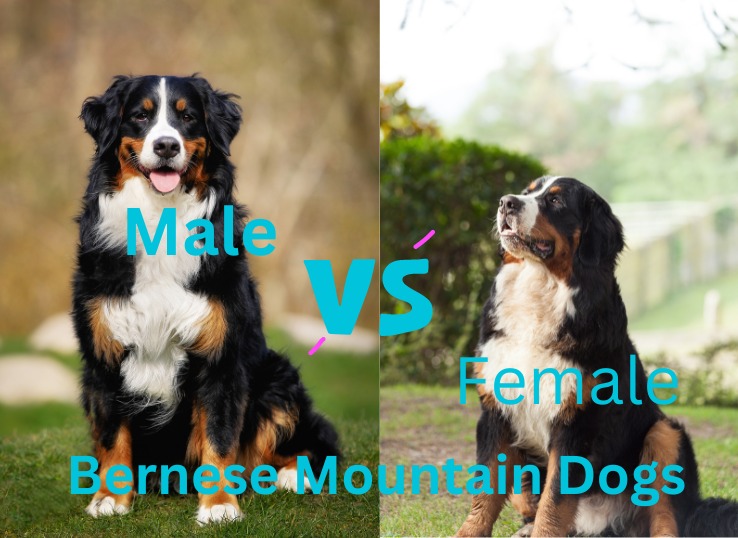Are Bernese Mountain Dogs Good With Cats? (7 Steps to Introduce a Berner with cat )
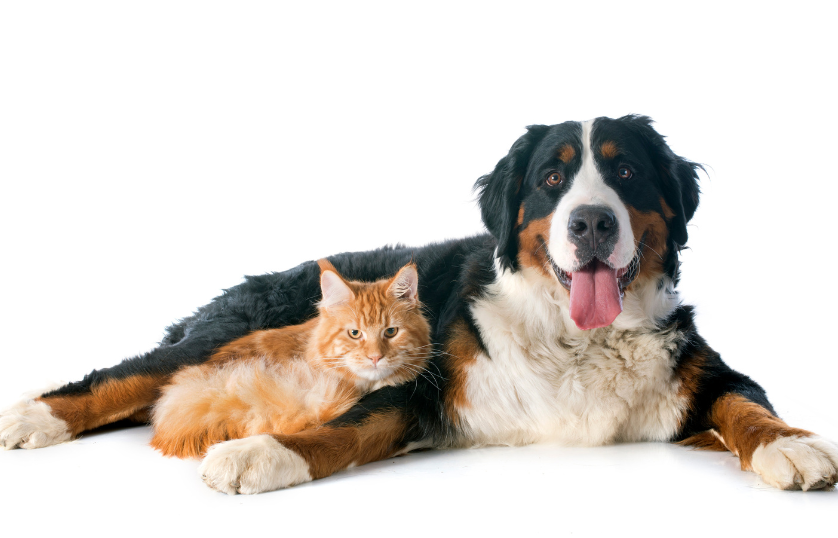
Planning on growing a Bernese mountain dog and need to know are Bernese Mountain Dogs good with cats. Bernese Mountain Dogs do not have a strong prey drive; therefore, they will get along with a cat. A cat may feel more frightened because of their large size. Thus, ensure to introduce both pets to each other positively and supervise all primary interactions. Learn everything about Bernese mountain dog cat kindliness and how to make your Berner safer with cats in this guide.
Table of Contents
Temperament of Bernese Mountain Dog
Bernese Mountain Dogs are recognized for being an experienced mix of confident and kind. They have delightful personalities and are smart and keen to please, making them comparatively easy to train. These dogs are also known to be tolerant with kids and don’t get annoyed easily; because, they’re quite low-energy dogs.
You perhaps won’t see a Berner bothering a feline too much as they do not have a strong prey drive. Therefore, several owners have an easy time training a Bernese to live with felines than with numerous other breeds. These canines are smart and quick learners that outshine in obedience.
Are Bernese Mountain Dogs Good With Cats? Answer Revealed
A distinctive mistaken belief several individuals make is discerning that all dogs hate felines and vice versa. This is not right, and numerous dog breeds are outstanding with cats. All dogs that aren’t cat-friendly can similarly be trained to be harmless around cats.
So, from the belief of knowledgeable Bernese mountain dog specialists, mountain dogs score out of five on a scale of breeds that are good with cats.
Introducing your Bernese mountain dog with Cats (7 Steps)
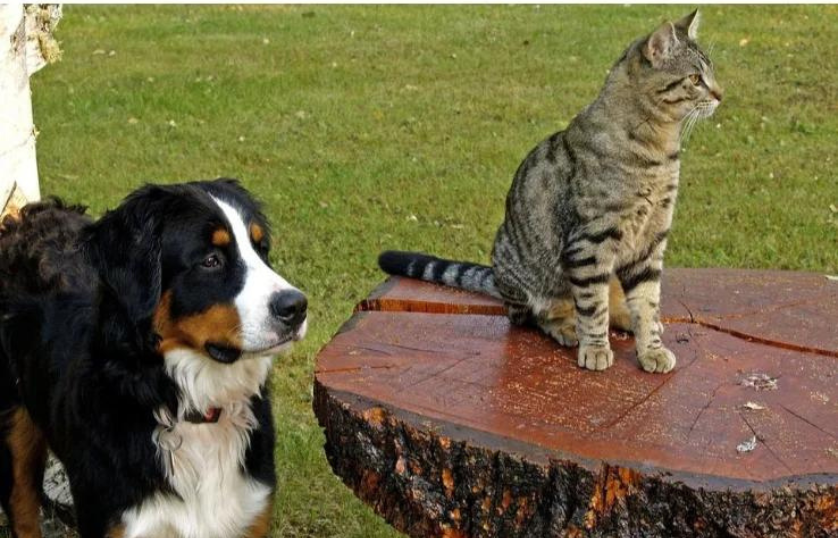
In spite of the misconception, numerous dogs and cats can live peacefully. Keep an eye on these simple actions to learn how to introduce a Bernese mountain dog to a cat.
- Make sure your Bernese mountain dog knows standard instructions like ‘sit,’ ‘stay,’ as well as ‘down’ before familiarizing yourself.
- Set up a harmless area for both pets, where the additional pet cannot enter.
- Have them disconnected at the start for the initial few days. Ensure the Bernese mountain dog and the cat have had the required shots.
- Feed a mountain dog and your feline on contradictory sides of a locked door. This will make them link each other’s presence with encouraging things.
- When they both can swallow tranquility beside the door, begin having a meet and welcome in a familiar place of your home. Have a primary couple of sessions short-lived and calm with your mountain dog on a string. Treat both animals for exemplary behavior.
- Continue these face-to-face meetings daily. Make sure to save your pets’ favorite treats for these meetings. If your feline needs to leave, let them to, but ensure your Bernese mountain dog puppy doesn’t chase. Go for ending the meetings just before any pet exposes signs of stress or aggression.
- Once they appear to be attaining a long well, let them spend some time in the part with.
Things to consider after a successful introduction between your Bernese Mountain dog and cat
Don’t be fast to allow the two to cooperate without supervision. NOTE! Both your cat and the Bernese Mountain dog can be good actors. These animals might pretend to love each other in your existence, only want physical quickly after you leave the room.
At least control the two for around 2 to 3 weeks before exiting them unverified. Let yourself ‘invisible’ throughout this time by leaving the room and peeping on them.
This will aid you in starting whether the recently formed bond is honest. Always feed your feline first before your Bernese Mountain dog-this only smears if you are familiarizing a grownup Berner to a cat.
This supports that the cat is also correspondingly significant to the dog. Place their feeding dishes in the same room; however, in different places-eating together will make their bond strong.
Why do Bernese Mountain Dog Puppies Hate Cats?
Not all Berners don’t like felines; some are good with them. Once Bernese Mountain Dogs hate cats, the most usual factor is straightforward. Like all canines, Bernese Mountain Dogs can retain some of the hunting instincts they were primarily bred for. Because of this, Bernese Mountain Dogs puppies love racing all moving things.
Meanwhile, the majority of cats will escape once they encounter them, so it’s simple to get why they are recognized for not being sociable with each other. Mountain dogs actually enjoy chasing after felines not because they hate them but primarily due to fast-running animal activates; a robust, natural desire to go after overcomes any socialization. If any stress seems, go back to the prior steps and echo them.
Issues That Can Arise
1. Strong Instincts
All the qualities that are possessions for working dogs, for example, the tendency to be verbal and even the inclination to herd, can be fairly prominent in mountain dogs. Most of these behaviors can be difficult to unlearn as Bernese Mountain Dogs keep strong characters.
2. Barking
Your Berner could bark at your cat and, actually, could be vocal generally. Training does amend this behavior; however, the pup could revert occasionally. Instead, some Berners are glad once they keep fellow pets and have fewer social issues, comprising less barking.
3. Herding
Herding can also be an obstinate habit. Mountain dogs do require some management around felines until the dynamics among the animals are steady and expectable.
A Berner dog is very friendly with felines; however, he does bark and follows them everywhere as if to restrain them once they run around. This manner is very distinctive for Bernese Mountain Dogs, even though, again, more depends on the feline’s and the dog’s individual nature.
What are some common challenges when introducing a bernese mountain dog to a cat?
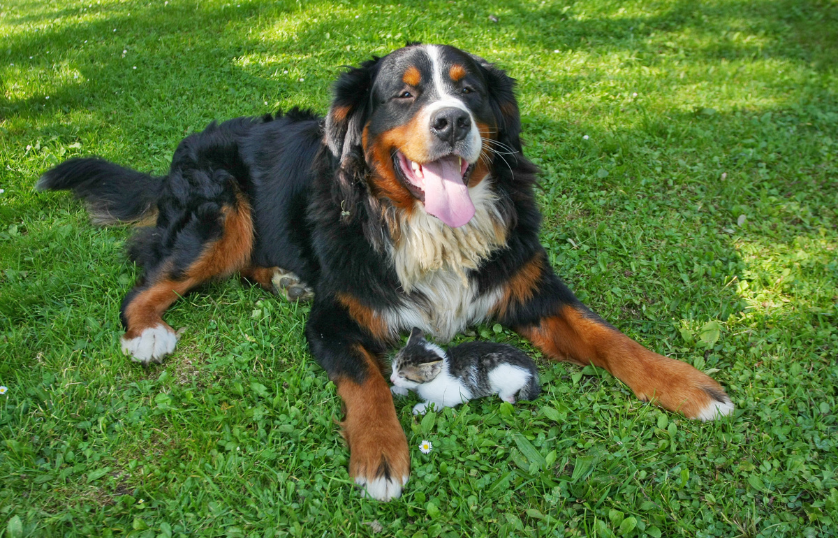
Introducing a Bernese Mountain Dog to a cat can present several common challenges, even though Bernese Mountain Dogs are generally known for their gentle and friendly nature towards both humans and other animals. Here are some of the challenges you might face during the introduction process:
- Difference in Energy Levels: Bernese Mountain Dogs and cats may have different energy levels, which can affect their interactions. Dogs are typically more active and may want to play more often than cats, which could lead to stress or irritation for a less active or more reserved cat.
- Prey Drive: While Bernese Mountain Dogs are not known for having a high prey drive, individual differences exist, and some may exhibit a stronger prey drive towards smaller animals, including cats. This natural instinct can lead to chasing or intimidating behavior, which needs to be managed through training and supervision.
- Size and Intimidation: The large size of Bernese Mountain Dogs can be intimidating to cats, especially during initial introductions. Cats may feel threatened by the sheer size and presence of a larger dog, requiring careful management to ensure the cat feels safe and secure.
- Jealousy or Resentment: Introducing a new pet into the household can sometimes lead to feelings of jealousy or resentment from the existing pet, whether it’s the dog or the cat. Managing the emotional well-being of both pets is crucial to prevent any negative feelings from developing and to ensure a harmonious coexistence.
- Supervised Interactions: Ensuring the safety of both pets during the introduction process is paramount. This often requires closely supervised interactions to monitor for any signs of aggression or fear. If either pet exhibits distress, it’s important to separate them and try again later, gradually increasing the time they spend together under supervision.
- Providing Separate Spaces: Both pets should have their own separate spaces where they can retreat and feel safe. This includes separate feeding areas, beds, and, for the cat, high perches or areas that are inaccessible to the dog. Having their own spaces helps reduce potential conflicts and gives each pet a sense of security.
- Training and Socialization: Proper training and socialization are key to a successful introduction. This may involve obedience training for the dog to ensure it responds to commands and does not overwhelm the cat. Similarly, helping the cat become comfortable with the dog’s presence through controlled and positive experiences is essential.
By addressing these challenges with patience, understanding, and consistent effort, it’s possible to help a Bernese Mountain Dog and a cat develop a peaceful and even affectionate relationship.
How Long Does It Take for Your Cat to Get Used to Your Bernese Mountain Dog?
It might take one week or 1 to 2 months for a cat to get used to your Bernese Mountain dog puppy in the same room or home. Keep in mind that both of these two pets’ characters, age, level of individuality, and activity play an essential role in defining how fast they get along with each other.
Thus, be sure to have a dog that praises your cat’s nature.
Why do Bernese Mountain Dogs dislike Cats?
Not all Bernese Dogs don’t love cats; some get by with them. Once Bernese Mountain Dogs hate felines, the most common aspect is fairly straightforward. Like all dogs, Bernese Mountain Dogs still keep some of the hunting instincts they were primarily bred for. That’s why Bernese Mountain Dogs like chasing all moving things, whether a cat or a toy.
As most cats will escape once they come across, it’s simple to observe why they are recognized for not being approachable to each other. Mountain dogs actually like chasing after felines, not as they dislike them; however, mainly as a fast-running animal activates a strong impulse to go after overcomes socialization.
How to Stop a Bernese mountain dog Killing Cat?
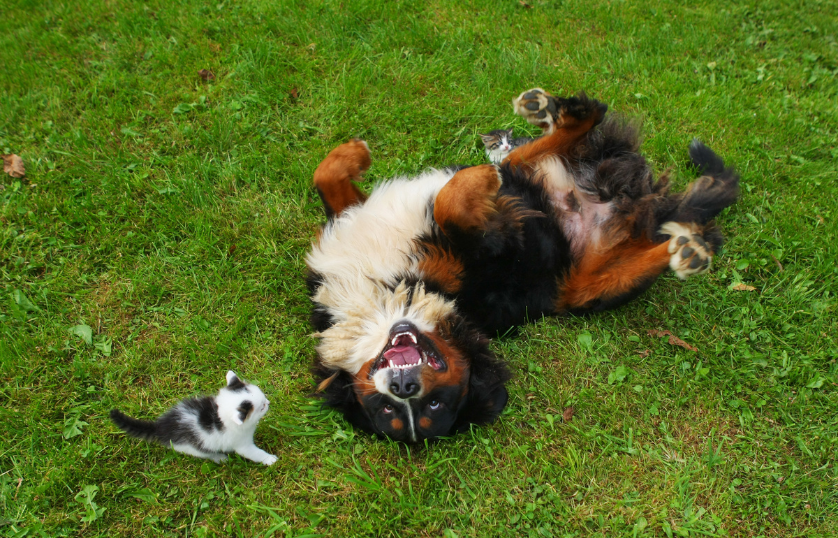
The best method to promise your Bernese mountain dog does not kill a cat is to grow them with felines when they’re young, before three months of age. At this stage, they will usually need to have fun with the cats and won’t get them as prey.
Suppose your mountain dog has killed a cat in the past; it’s perfect if you have them in an open, bounded area. Once taking those for ambles, try to avoid going after evening and before dawn, as that’s when felines are most energetic and likely to be nomadic in the neighborhoods.
Frequently asked questions
Q: Are Bernese mountain dogs get along with other animals?
Most Berners are pacific and friendly with other animals. However, some Berners are violent toward other dogs. This sensitive dog must be handled friendly, with much admiration and encouragement.
Q: Is it good to get a cat or dog first?
Overall, the best plan would be to first get a middle-aged, polite dog who shows interest in felines and, after that, a kitten who has been grown in a household with welcoming or uninterested dogs around.
Conclusion
Are Bernese Mountain dogs good with cats? Yes, Bernese mountain dogs are good with cats. Introduce your mountain dog to your cat once the two are calm. I suggest that you allow the two to encounter after an evening meal. This helps decrease a hostile conflict from ensuing.
Make sure that you follow the steps to introduce your Berner with cats systematically to prevent confusing your canine and feline.
If you observe that your mountain dog keeps chasing a feline even after a positive introduction, please ensure that; you remove any triggers that can let your Berner chase your feline. Keep your Bernese mountain dog puppy engaged, utilize treats to strengthen positive behaviors, and deliver your cat to its safe place.



![How Big Do Bernese Mountain Dogs Get? [Normal Size Guide for Berners] 21 How-Big-Do-Bernese-Mountain-Dogs-Get](https://animalpedias.net/wp-content/uploads/2022/12/How-Big-Do-Bernese-Mountain-Dogs-Get.jpg)
